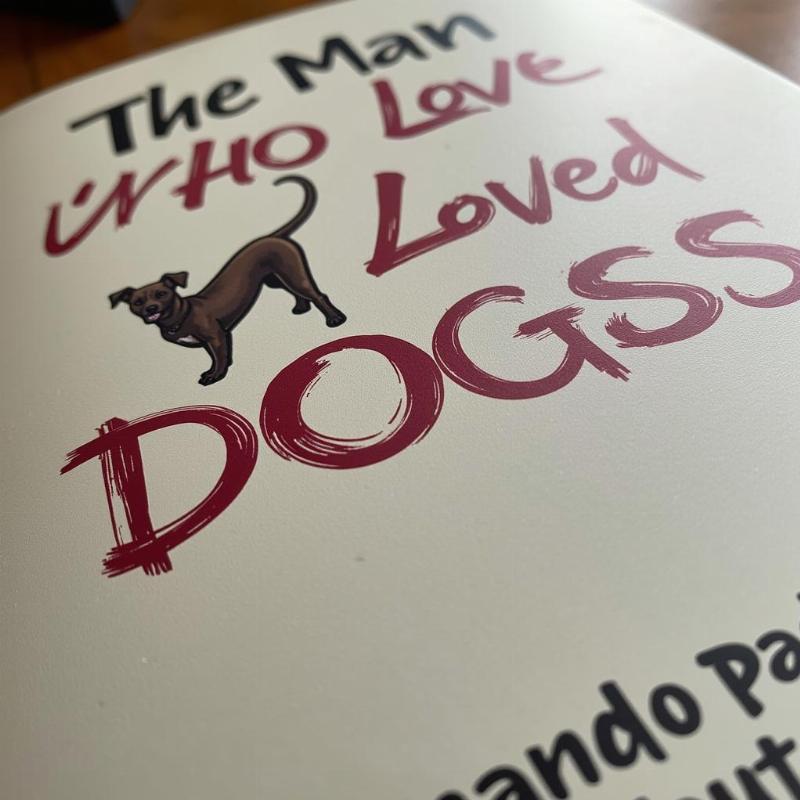Leonardo Padura Fuentes’s “The Man Who Loved Dogs” is a complex and compelling novel that intertwines the lives of Iván, a disillusioned Cuban writer, and Ramón Mercader, the exiled assassin of Leon Trotsky. The novel uses the shared love of dogs as a poignant point of connection between these two vastly different men, highlighting themes of loyalty, betrayal, and the enduring impact of historical events on individual lives. Through this lens, Padura explores the complexities of the Cuban Revolution and its aftermath, prompting readers to consider the sacrifices made in the name of ideology and the enduring power of the human-animal bond.
Unpacking the Canine Connection in Padura’s Masterpiece
Padura masterfully uses dogs as a symbolic thread throughout the narrative. For Iván, they represent a sense of unconditional love and companionship, a stark contrast to the political betrayals and disillusionment he experiences in his own life. For Mercader, his affection for dogs, particularly his Borzoi, offers a glimpse into a more humane side of this complex figure, a man burdened by the weight of his actions. This shared love for dogs allows Padura to explore the shared humanity of these men, despite the vast differences in their lives and choices. This shared passion also provides a unique narrative framework, allowing Padura to weave together their stories in a way that is both unexpected and deeply resonant.
The Historical Backdrop: Trotsky, Mercader, and the Shadow of Stalin
“The Man Who Loved Dogs” is not just a story about dogs; it is a deep dive into a pivotal moment in 20th-century history: the assassination of Leon Trotsky. Padura meticulously recreates the historical context, offering readers a glimpse into the political climate that led to Trotsky’s exile and eventual murder. He portrays Mercader not as a monstrous caricature but as a complex individual grappling with the consequences of his actions. The novel doesn’t shy away from the brutality of Stalin’s regime and the far-reaching impact of his purges, illustrating how these events ripple through the lives of ordinary Cubans like Iván.
Loyalty and Betrayal: Exploring the Human Cost of Ideology
The themes of loyalty and betrayal are central to “The Man Who Loved Dogs.” Iván experiences betrayal on both a personal and political level, leading him to question the ideals he once held dear. Mercader, on the other hand, embodies the ultimate act of betrayal, assassinating a man he had come to admire. Through these contrasting figures, Padura examines the complexities of loyalty in a society gripped by political ideology. He explores the difficult choices individuals face when their personal beliefs clash with the demands of the state, and the lasting consequences of those choices. The novel prompts readers to consider the price of loyalty, both to individuals and to ideals, and the devastating impact of betrayal on the human spirit.
The Enduring Power of Storytelling in “The Man Who Loved Dogs”
Padura’s masterful storytelling elevates “The Man Who Loved Dogs” beyond a simple historical novel. He weaves together multiple narratives, seamlessly blending fact and fiction, creating a richly textured and thought-provoking reading experience.  The Man Who Loved Dogs book cover The novel’s intricate structure, coupled with its evocative prose, draws readers into the lives of its characters, forcing them to confront uncomfortable truths about human nature and the enduring legacy of historical trauma.
The Man Who Loved Dogs book cover The novel’s intricate structure, coupled with its evocative prose, draws readers into the lives of its characters, forcing them to confront uncomfortable truths about human nature and the enduring legacy of historical trauma.
Conclusion: A Canine Lens on Cuban History and the Human Condition
“The Man Who Loved Dogs” is a powerful exploration of loyalty, betrayal, and the enduring impact of the past. By using the shared love of dogs as a unifying thread, Padura offers a unique perspective on a pivotal moment in history and its ripple effects on individual lives. The novel challenges readers to confront the complexities of human nature and the difficult choices we face in the face of political upheaval and ideological conflict. It is a testament to the power of storytelling to illuminate the past and offer insights into the enduring human condition.
FAQ:
- Is “The Man Who Loved Dogs” based on a true story? While the novel incorporates the historical event of Trotsky’s assassination, the characters of Iván and his interactions with Mercader are fictional.
- What is the significance of the dogs in the novel? The dogs represent loyalty, companionship, and a connection to something beyond the political turmoil. They serve as a powerful symbol of hope and humanity amidst betrayal and disillusionment.
- Why should I read “The Man Who Loved Dogs”? This novel offers a compelling blend of historical fiction, political intrigue, and profound reflections on human nature. It’s a thought-provoking read for anyone interested in Cuban history, the Cold War, or the complexities of loyalty and betrayal.
- What other books by Leonardo Padura Fuentes are recommended? Consider exploring the Havana Quartet detective series, which features Lieutenant Mario Conde and offers a gritty portrayal of Cuban society.
- Where can I purchase “The Man Who Loved Dogs”? The book is readily available online and in bookstores across the US.
Beautdogs.us is your premier destination for all things dog-related in the US. We offer expert advice on dog breeds, care, and products, providing a trusted resource for both new and experienced dog owners. Our mission is to empower you to provide the best possible care for your furry companions. Learn more about how we can help you navigate the world of dog ownership. Contact us at [email protected] or +1 501-555-7529. Visit Beautdogs.us for expert advice and resources to enhance your dog’s well-being.